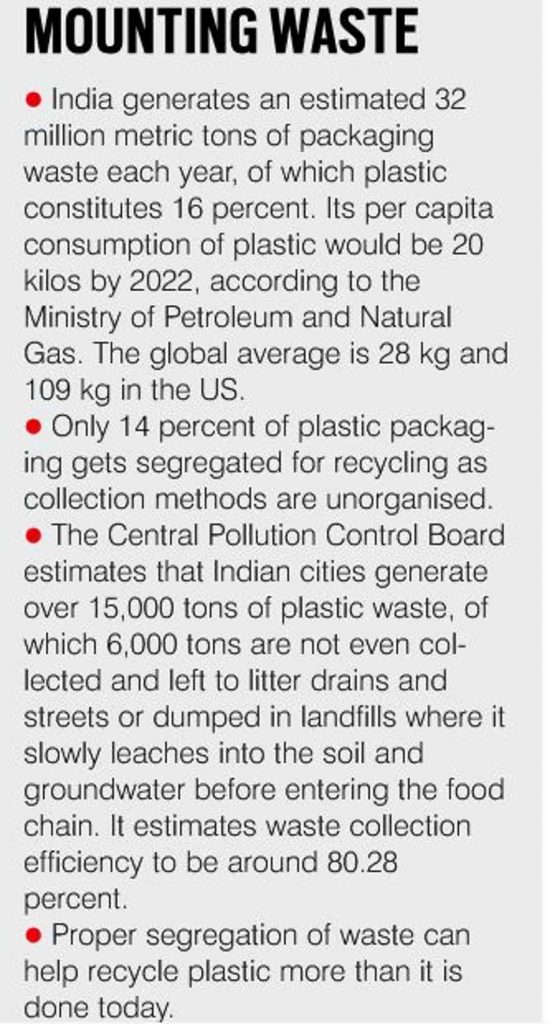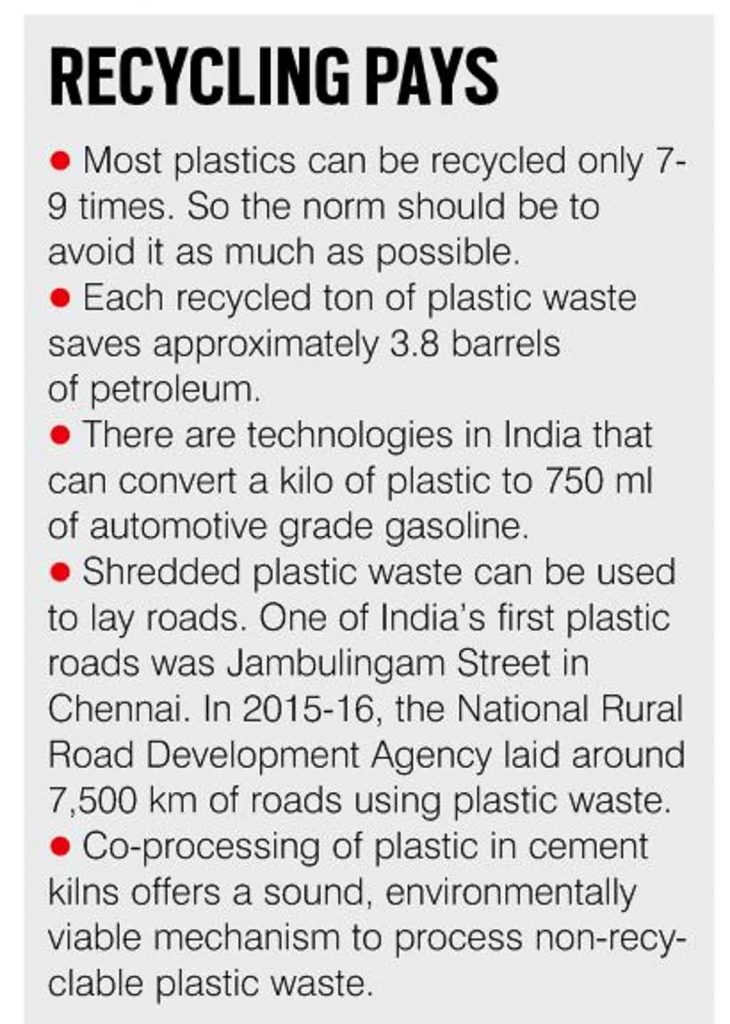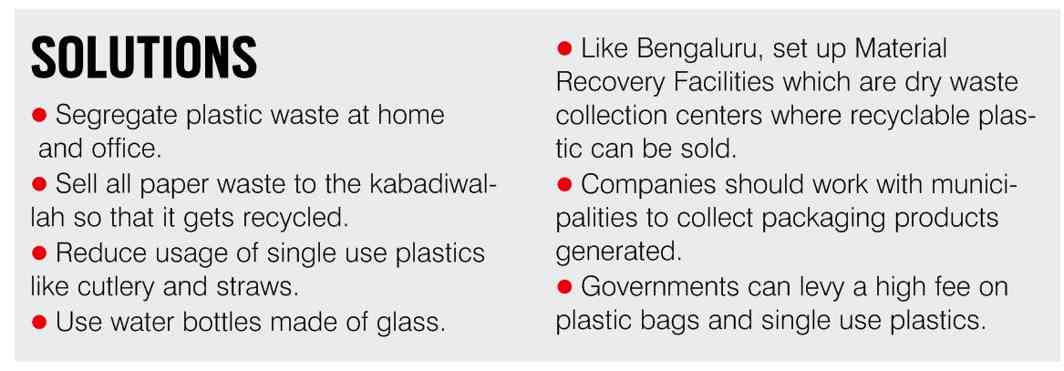Above: Plastic waste piled up near a drain in Mumbai
Though the intention of the Maharashtra government to ban plastics was good, it provided no alternatives to Plastic and left small vendors and businessmen to fend for themselves
By Ramesh Menon in Pune
The ban on plastics in Maharashtra came too suddenly without any planning. Last fortnight, the state banned the use, manufacture, transport, distribution, sale, storage and import of plastic bags along with single-use disposable dishes, cups, plates and glasses and plastic packaging for products.
The ban was not done in a phased manner to allow alternatives to emerge. That is why its implementation and success will not be easy. Maharashtra could have taken a leaf out of Kerala’s experience when it set about implementing green protocols for events. It reached out to organisations that provide steel utensils and cutlery and created solutions before doing away with plastic.
However, Maharashtra has permitted the use of PET bottles if the manufacturers convert them to pellets for recycling. They are to work with NGOs and rag-pickers to ensure that the pellets get recycled. For the moment, exemptions have been granted to store food grain, package items like chips and chocolates and plastic garbage bags and milk pouches above 50 microns in thickness.
 In India, 43 percent of manufactured plastic is used for packaging and most of it is of the single use variety. Chandra Bhushan, deputy director of Delhi-based Centre for Science and Environment, said the ban was necessary as single use of plastic material has a high environmental cost. Nearly half of all plastic waste in the world comes from packaging. The United Nations has pointed out that most of it is discarded a few minutes after its first use.
In India, 43 percent of manufactured plastic is used for packaging and most of it is of the single use variety. Chandra Bhushan, deputy director of Delhi-based Centre for Science and Environment, said the ban was necessary as single use of plastic material has a high environmental cost. Nearly half of all plastic waste in the world comes from packaging. The United Nations has pointed out that most of it is discarded a few minutes after its first use.
Shopkeepers had bitterly complained to government officials that the three-month window to prepare for the ban was hardly enough as there were just no alternatives available. Ironically, the government too had not worked on any. If the ban has to succeed, it has to be implemented in phases, with alternatives being introduced. After failing twice, Kenya had last year imposed a ban on plastic for the third time. But, it had learnt from two earlier mistakes and ensured that there were alternatives in place.
The state government should have first mentally prepared consumers and shopkeepers before taking such a major step. We are so accustomed to using plastic bags and plasticware for everything imaginable.
BAD EXECUTION
Mumbai-based environmental activist, Darryl D’Monte, told India Legal: “The ban was overdue, but badly executed. It is still work in progress. There is no clarity over certain plastic items, like bin-liners. While citizens could be penalised—though Rs 5,000 for the first time would be too much—for carrying plastic outside their homes, there shouldn’t be a witch-hunt within homes. Primarily, the ban should be aimed at manufacturers of plastic items and bigger stores.”
Pune resident Yash Agarwal said that a vendor selling food items near his house had almost gone out of business as he couldn’t pack food and sell it to consumers as curries are gravy based. The only alternative is expensive aluminum foil which would make his business unviable. He said he had seen numerous vegetable vendors going out of business as well as consumers land up hoping to get it packed. Paper bags do not work and cloth bags are also expensive. Said Agarwal: “The ban on use of plastic in Maharashtra, though well-intentioned, is being executed terribly. There are no sustainable alternatives. Surprise raids in Pune and Mumbai with heavy fines have instilled fear, leading to protests, while the local economy too has suffered.”
Maharashtra generates the maximum plastic among states, followed by Delhi, Kolkata and Ahmedabad. It produces more than 4.6 lakh tons of it every year. Twenty percent of India’s plastic consumption is by Maharashtra. This was reason enough for it to launch a programme to create awareness. However, it did not provide alternatives despite it being there.
Alternatives like cloth and jute bags, food containers and cutlery made of bamboo, cloth, paper, jute, cheap wood and so on are there. Bio-based and biodegradable plastic which utilises starch, cellulose and polylactic acid as raw materials too has short-term use. But, none of this was considered. Alternatives can be expensive and millions of small traders cannot afford it. But, the government did not even think of subsidising the alternatives to make the transition possible and smoother.
Dr Suneel Pandey, waste management expert at TERI, told India Legal: “The ban is good as disposal of plastics poses serious problems. Ultimately, manufacturers will have to think of alternatives and put in money to move towards finding it. What is good is that the debate on the phasing out of plastics has started.”
INDUSTRY UNHAPPY
Sources in the plastics industry claim that the ban will result in a loss of three lakh jobs and around Rs 150 billion a year. Neemit Punamiya, general secretary of the Plastic Bags Manufacturers Association of India, said the government needs to give them time to come up with alternatives as it cannot be done overnight. After all, entrepreneurs had made heavy investments, have loans to repay and salaries to be disbursed.
The Federation of Indian Chambers of Commerce and Industry lamely said that alternatives would also damage the environment. Clearly, the industry does not want to invest in cleaner technology and methods. In Mumbai, businessmen were asking for at least seven years to find alternatives.
 Most of the plastics used in Maharashtra come from Gujarat. Raids on the Gujarat-Maharashtra border found truckloads of plastic goods flouting norms. There’s a huge pressure on the government from two lobbies, one of which has been granted an exemption from the ban for the next three months already—the milk cooperatives and dairies who sell millions of litres of their products in plastic pouches—and second, the e-commerce sector. The government is thinking of a ban on that too.
Most of the plastics used in Maharashtra come from Gujarat. Raids on the Gujarat-Maharashtra border found truckloads of plastic goods flouting norms. There’s a huge pressure on the government from two lobbies, one of which has been granted an exemption from the ban for the next three months already—the milk cooperatives and dairies who sell millions of litres of their products in plastic pouches—and second, the e-commerce sector. The government is thinking of a ban on that too.
Bharati Chaturvedi, founder and director, Chintan Environmental Research and Action Group, told India Legal: “The Maharashtra ban is key to reducing our plastic pollution, since it is focused on single use plastics. Non-recyclables should be the first focus, along with packaging in e-commerce. It also throws light on the need to evaluate the chain, and promote alternatives, so that smaller actors can be helped to shift to greener livelihoods. I fear that the industry-state negotiation about needing time for a phase out will result in endless non-implementation.”
The effects of plastics are deleterious. Drains and sewer lines all over the country are clogged with polythene bags and plastic waste leading to water-logging during rains and unseasonal floods. Mumbai and Chennai have seen the disastrous consequences of these floods in the recent past. In its report on solid waste management last year, the Brihanmumbai Municipal Corporation had underlined the challenge of discarded plastic bags on the streets.
EFFECTIVE PLAN
The Plastic Waste Management Rules 2016 mandated producers and brand owners to devise a plan in consultation with local bodies to introduce a collect-back system. This system, known as Extended Producers Responsibility, can go a long way in handling waste.
Numerous European countries like Norway and Sweden have opted for better waste management techniques 30 years ago. In Netherlands, residents have to segregate their waste and pay for the disposal of trash, but do not have to pay if the rubbish can be recycled. By incentivising recycling, this country has been able to change the mindset.
CK Mishra, Secretary, Ministry of Environment, Forests and Climate Change, said that collaborations and partnerships are keys to implementing effective waste and pollution management. A paper on “Opportunities and Challenges of Plastics Waste Management” by The Energy and Resources Institute said that the annual average per capita consumption of plastic in India is about 11 kg. It found that the sea near Mumbai, Kerala and the Andaman and Nicobar Islands was among the worst polluted in the world due to plastic. This should alarm us as plastic debris in water affects at least 267 species worldwide, including 86 percent of sea turtles, 44 percent of seabirds and 43 percent of all marine mammal species.
Four years ago, Toxics Link, a Delhi-based environmental group, in a study found that the ban on plastic bags in Sikkim, Delhi and Chandigarh had not achieved the desired result. Such a ban in countries that have weak environmental governance does not work. “The issue of restricting or banning the use of such products in limited geographical areas is fraught with serious threats of failure but a national ban on products is more likely to succeed,” the report said.
Unless there is political will and a strong public sentiment to make our surroundings cleaner and healthier, no ban will work in India.


